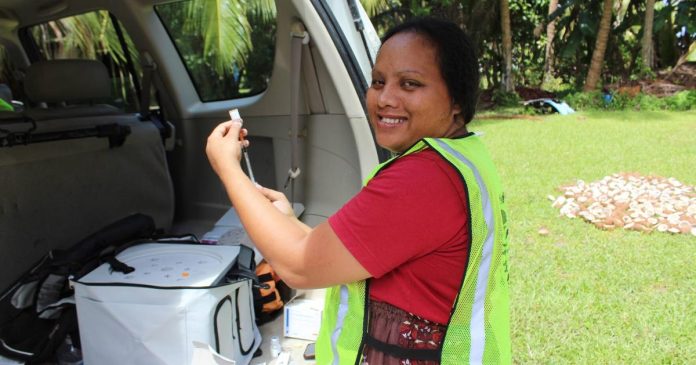With many neighbouring Pacific island countries getting Covid and the government reducing quarantine time for inbound travelers, the Marshall Islands Ministry of Health and Human Services is revamping its Covid procedures to be ready in case a border case leads to community transmission.
By closing its border in early March 2020, the Marshall Islands has remained one of the last handful of countries to be Covid free. It has seen only several border cases of Covid in quarantine, none of which led to community spread.
But seeing one Pacific country after another face outbreaks over the past few weeks coupled with the government in Majuro deciding to reduce from seven to three days the Hawaii quarantine prior to departure to the Marshall Islands, the ministry is shifting gears in Covid prevention activity.
Up to last week, it had used its Covid quarantine ward at Majuro hospital to house returning medical referral patients who gained treatment for various illnesses in Hawaii. In order to have the Covid ward free and ready for an actual Covid positive person, the eight medical referral patients who successfully completed their 14-day quarantine in Majuro hospital’s Covid ward last Tuesday are the last referral patients who will make use of the facility as a quarantine location.
“We’re gearing up for the eventuality of community spread of Covid here,” said Health Secretary Jack Niedenthal. Returning the Covid ward to its intended use for future Covid positive patients who become ill is just one of several steps the ministry is taking to plan ahead now that quarantine time in Hawaii has been reduced to three days. Authorities at the Ministry of Health and Human Services and at the Army base on Kwajalein are anticipating more Covid positive cases to appear in quarantine in Majuro and Kwajalein, which increases the possibility of spread to the community because of the contagiousness of Covid variants.
Since January, over 60 people have been taken off repatriation flights to Majuro and Kwajalein because they tested positive during the Hawaii quarantine phase. The result was zero cases of Covid in quarantine in Marshall Islands. But three days raises the risk of border cases, so the Ministry of Health is preparing.
A delegation of top health officials went to Kwajalein and Ebeye last week to work through protocols of handling a Covid positive person who is undergoing 14-day quarantine but needs hospitalisation at Ebeye hospital in the future.
In mid-February, the ministry resumed house-to-house Covid vaccinations in Majuro and Ebeye islands in order to improve the immunization rates. Later this month, public health teams will begin making follow up visits to remote outer islands to give islanders booster shots as part of preparing for the eventuality of a Covid outbreak.
“Good planning helps reduce chaos (if Covid gets here),” Niedenthal said, pointing out that virtually every country has seen chaotic situations develop once community spread broke out.
“The number one thing we’ve learned from Palau is to protect the hospital and the people in it,” said Niedenthal. What this means is that they plan to use covered gymnasiums in the community as “triage” locations where people can get Covid tests and vaccinations without coming to the hospital. “This is why community stations need to be set up almost immediately (if there is community spread),” he said.
A “lockdown” is also important, he said, so that everyone does not get Covid at the same time. “Eventually, everyone will get exposed to it. But a lockdown slows the spread, so the hospital can handle it in a more organised way.”
These are among lessons learned from Palau’s big outbreak that started at the end of 2021. “We’ve stayed safe and learned from others,” he said.
SOURCE: MARIANAS VARIETY/PACNEWS













